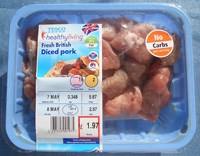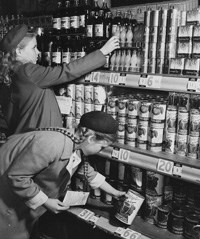
Top stories






More news


Marketing & Media
Ads are coming to AI. Does that really have to be such a bad thing?














Do ethical food labels help or hinder efforts to reduce the negative environmental and social impacts of producing, distributing and consuming food? This was the question raised in the recent debate, 'We need ethical food labels', hosted by WWF and Fairtrade Africa, and broadcast live on SAfm's AM Live. This was the first in a series of live Oxford Union style debates on key issues of sustainability and the green economy. These 'WWF and SAfm Decisive Debates' are moderated by Xolani Gwala. The live studio audience and AM Live listeners decide the outcome by voting, via SMS, for or against the motion.
Speakers for the motion included Noel Oettle of the Environmental Management Group, Tom McLaughlin of Woolworths and Jonathan Robinson, founder of Bean There Coffee Company. Arguing against ethical labels were Professor Linus Opara of the University of Stellenbosch, David Donde, founder and owner of Truth Coffee Cult and Jonathan Cherry, founder of Cherryflava Media.
The support of ethical labels, it's argued, like organic, Fairtrade, Marine Steward Council (MSC) fish and Farming for the Future help customers make more sustainable choices, easily and quickly where understanding the intricacies of sourcing is a challenge too large for individuals to contemplate. They help consumers to contribute towards making a difference by simply choosing an ethical food product, with the confidence that the product has endured a rigorous auditing process conducted by independent third parties.
The Fairtrade label in South Africa is an example of an ethical food label which is proving increasingly popular amongst South African consumers, with a four-fold increase in sales last year. Producers on the ground benefit from the Fairtrade system as more consumers support the label. Fairtrade not only sets the ethical and environmental standards in every step of the value chain, but provides producers with a fair price and they choose how to invest the additional premium to help grow their business, improve their products or to support their community.

Not only are ethical food labels of value to the customer and producer, they are good for the company too. Tom McLaughlin admits, "They add something ... they give us something that we can't add ourselves", and says that it helps business "commoditise sustainability" with independent NGO partnerships. Audits from 15 of Woolworths largest Farming for the Future fruit suppliers over the last three years show an average 20% reduction in the use of synthetic fertilisers, 50% reduction of pesticides, water reduction by more than 700 million m³, and an improvement soil health and biodiversity.
The benefits companies gain from these labels, ran one of the arguments against ethical food labels, is disproportionate to those received by farmers. In this case ethical food labels become another marketing tool for business to convince their customers to purchase products with a price premium, resulting in further profit and improved brand value but, ironically, promoting the injustice that they are trying to change. Opera claims that 80% of the value of the product leaves the farm. In reference to a study conducted in the UK, he says 80% of product claims were unsubstantiated, while 7 out of 10 customers did not understand what the labels were about.
In addition, these labels often appear in "selective pockets" i.e. companies are recognised for a "sticky label" on one of their product ranges, while thousands of other products remain unchanged. Concern was also raised about the labels pushing up the price of food, resulting in further food insecurity.
The team for the motion quickly countered that these labels are the tools to prevent companies from making claims on products that cannot be substantiated. Well administered labels do not certify business as usual, "green washing" nor low production standards but rather set high standards and provide a transparent system of checks and balances, with independent audits to assure customers about the authenticity of their claim.
The issue of regulatory control was an important one for the opposing team. Donde argued that the introduction of the Consumer Protection Act (CPA) is sufficient to keep companies accountable for what they claim, eliminating the need for sticky labels.
Participants noted, however, that legislation and regulatory systems have largely failed to protect our resources. Besides, the CPA does not deal with animal welfare issues. Donde says that growing the "conscious" consumer through, among other, social media is the answer and not legislation or ethical labels.

While ethical food labels have benefited certified farmers, they do not help the majority of small scale farmers who have been producing food ethically for years but who cannot afford accreditation. Cherry compared ethical food labelling to "a plaster on a severed limb" and urged business to lobby government rather to address the real causes of inequality and strive for more fundamental change.
He urged companies to comply with good corporate governance and ethical business rather than ethical labels.
Panellists in favour of ethical food labels argued that labels are not the solution to unsustainable and unethical food production, but rather a small beginning to solving a problem that can make a substantial difference in the long term.
There are undeniably practical challenges around ethical food labelling. Opara referred to ethical food labels as "flashing lights" on product packaging making a myriad claims creating even more customer confusion. He says that a product could pass through 21 possible ethical labels from seed to food on a plate. Opera argued that the majority of South African's purchase their food from the informal sector and could not afford the 'luxury' labels and that all it did was make "rich people" feel good.
During the rebuttal when questions were taken from listeners and the audience, Fairtrade's executive director, Boudewijn Goossens concluded, "In the long-term, we should not need ethical labels of any sort".
In addition to being an exciting live event, the debate made for great radio, and in the end the people got the deciding voice, the votes tallied and a significant 74% in favour of ethical food labels. Consumers overwhelmingly support environmentally and socially sound methods for the production of their food - identified by ethical "sticky" food labels and independently certified to assure them that their food supports a more sustainable planet.
With the debate for ethical labels won, it was time for one last cup of Fairtrade coffee before heading out into the blustery streets of Cape Town where the rain and mist danced to the rhythm of the South-Easter.